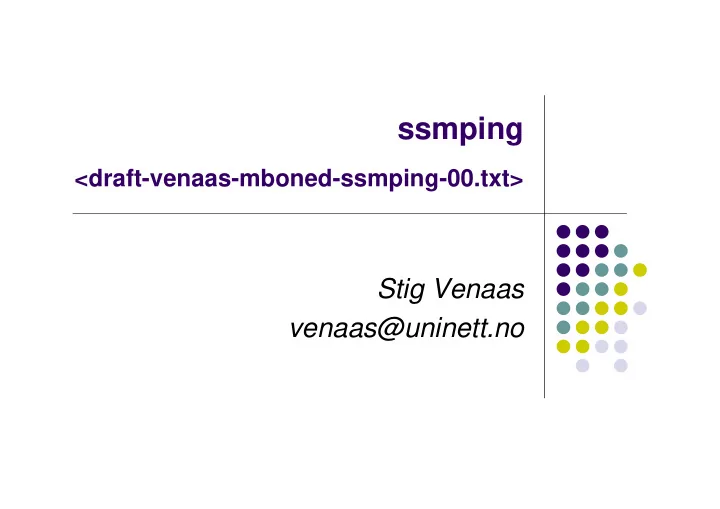

ssmping <draft-venaas-mboned-ssmping-00.txt> Stig Venaas venaas@uninett.no
ssmping � A tool for testing multicast connectivity and more � Behaviour is a bit like normal icmp ping � Implemented at application layer using UDP � No additional requirements on the operating system � The operating system and network must support SSM � A server must run ssmpingd � A client pings server by sending unicast ssmping query � The server replies with both unicast and multicast ssmping replies � In this way a client can check that it receives SSM from the server � You can run your own server, also several public IPv4 and IPv6 servers on the Internet � And also parameters like delay, number of router hops etc.
How it works Client Server User runs t t ssmping <S> Client joins S,G Clients sends unicast to S Server receives unicast ssmping query Client receives Responds with ssmping replies and unicast reply and prints RTT and multicast reply to G hops from server Client sends a new query every second
Example output $ ssmping -c 5 -4 flo.nrc.ca ssmping joined (S,G) = (132.246.2.20,232.43.211.234) pinging S from 158.38.63.20 unicast from 132.246.2.20, seq=1 dist=13 time=122.098 ms unicast from 132.246.2.20, seq=2 dist=13 time=122.314 ms multicast from 132.246.2.20, seq=2 dist=13 time=125.061 ms unicast from 132.246.2.20, seq=3 dist=13 time=122.327 ms multicast from 132.246.2.20, seq=3 dist=13 time=122.345 ms unicast from 132.246.2.20, seq=4 dist=13 time=122.334 ms multicast from 132.246.2.20, seq=4 dist=13 time=122.371 ms unicast from 132.246.2.20, seq=5 dist=13 time=122.360 ms multicast from 132.246.2.20, seq=5 dist=13 time=122.384 ms --- 132.246.2.20 ssmping statistics --- 5 packets transmitted, time 5003 ms unicast: 5 packets received, 0% packet loss rtt min/avg/max/std-dev = 122.098/122.286/122.360/0.394 ms multicast: 4 packets received, 0% packet loss since first mc packet (seq 2) recvd rtt min/avg/max/std-dev = 122.345/123.040/125.061/1.192 ms
What does the output tell us? � 13 unicast hops from source, also 13 for multicast � Multicast RTTs are slightly larger and vary more � The difference in unicast and multicast RTT shows one way difference for unicast and multicast replies, since they are replies to the same request packet � The multicast tree is not ready for first multicast reply, ok for 2 nd � No unicast loss, no multicast loss after tree established
Is it useful? � Complements multicast beacons � Useful for “end users” or others that want to perform a “one-shot” test rather than continuously running a beacon � Beacons don’t show how long it takes to establish the multicast tree, they only show the “steady state” � We’ve seen cases where it takes much longer than expected � Neither do they compare unicast and multicast � Are there other data than RTT and hops that should be measured? � Hops are measured by always using a ttl/hop count of 64 when sending replies
Also asmping. Example output: sv@xiang /tmp $ asmping 224.3.4.234 ssmping.uninett.no ssmping joined (S,G) = (158.38.63.22,224.3.4.234) pinging S from 152.78.64.13 unicast from 158.38.63.22, seq=1 dist=23 time=57.261 ms unicast from 158.38.63.22, seq=2 dist=23 time=56.032 ms multicast from 158.38.63.22, seq=2 dist=7 time=207.876 ms multicast from 158.38.63.22, seq=2 dist=7 time=208.567 ms (DUP!) unicast from 158.38.63.22, seq=3 dist=23 time=56.852 ms multicast from 158.38.63.22, seq=3 dist=21 time=70.352 ms multicast from 158.38.63.22, seq=4 dist=21 time=57.208 ms unicast from 158.38.63.22, seq=4 dist=23 time=57.910 ms unicast from 158.38.63.22, seq=5 dist=23 time=56.206 ms multicast from 158.38.63.22, seq=5 dist=21 time=57.375 ms
Protocol overview � All messages have following format � Message type, one octet (Q or A) � Options in TLV format � Client sends Q message with some options � Server sends two identical replies, one unicast and one multicast � Changes Q into A, echoes back all options, may add some � Server should only add options when requested? � Responses have ttl/hop count of 64
Client options Client identifier � IP address, PID, hashed?, some random number? � Used by client to know it is not a reply for someone else � Sequence number � 1 for first request, increased by 1 for each request � Timestamp in microseconds (also for servers) � Multicast group � Only for ASM (or?), see later slide � Option request option � Client might ask server to include certain options � Reply size � Client asks server to send response of a given size � Can it be used for DoS attacks? Should client instead pad its � queries? May be hard to know response size if server is asked to add options
Server options � Server may append options (only by request?) � Timestamp in microseconds (also for clients) � Version Free text vendor/implementation version etc (UTF-8?) � � Pad If client asks for given reply size �
Server behaviour � What should server do if it is overloaded? It’s been suggested that server can multicast generic/common � replies to clients. Is that useful? Should it simply not respond? � Should it respond with some “leave me alone” message � � Might also be useful if server restricts which clients to serve
asmping � Even more useful to have tool for ASM (IMO) � Registers/MSDP, multiple forwarding paths… � Want to allow client to pick multicast group (or prefix) � For IPv6 we should use fixed group id and allow /96 prefix to be specified � Useful to choose group to choose different RPs or scopes � Can client pick address that is used by some multicast session in order to attack it? � How to reduce the security issue? � Server rate limit? � Fixed destination port?
Next steps � Want to reserve port number and/or SRV name � Open question whether client should use a fixed port and whether it can be the same as the server port � Reserve IPv4 SSM address? � The source might be running other multicast applications � Reserve IPv6 Group IDs � Used for both SSM and ASM � Don’t think reserving anything for IPv4 ASM is doable � Need input to improve protocol
Recommend
More recommend